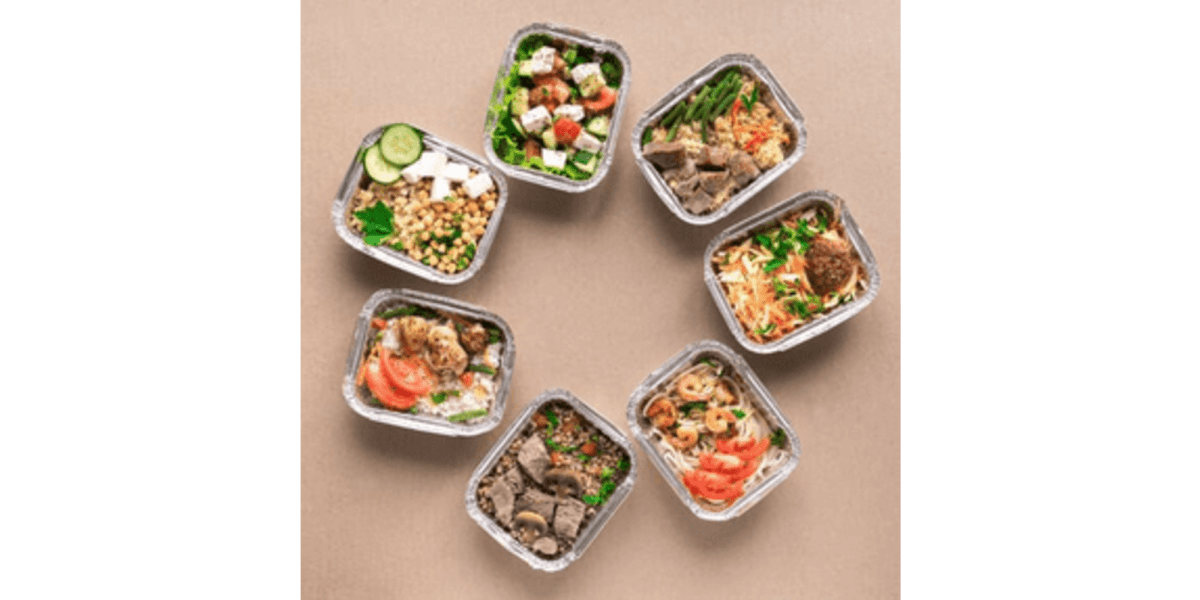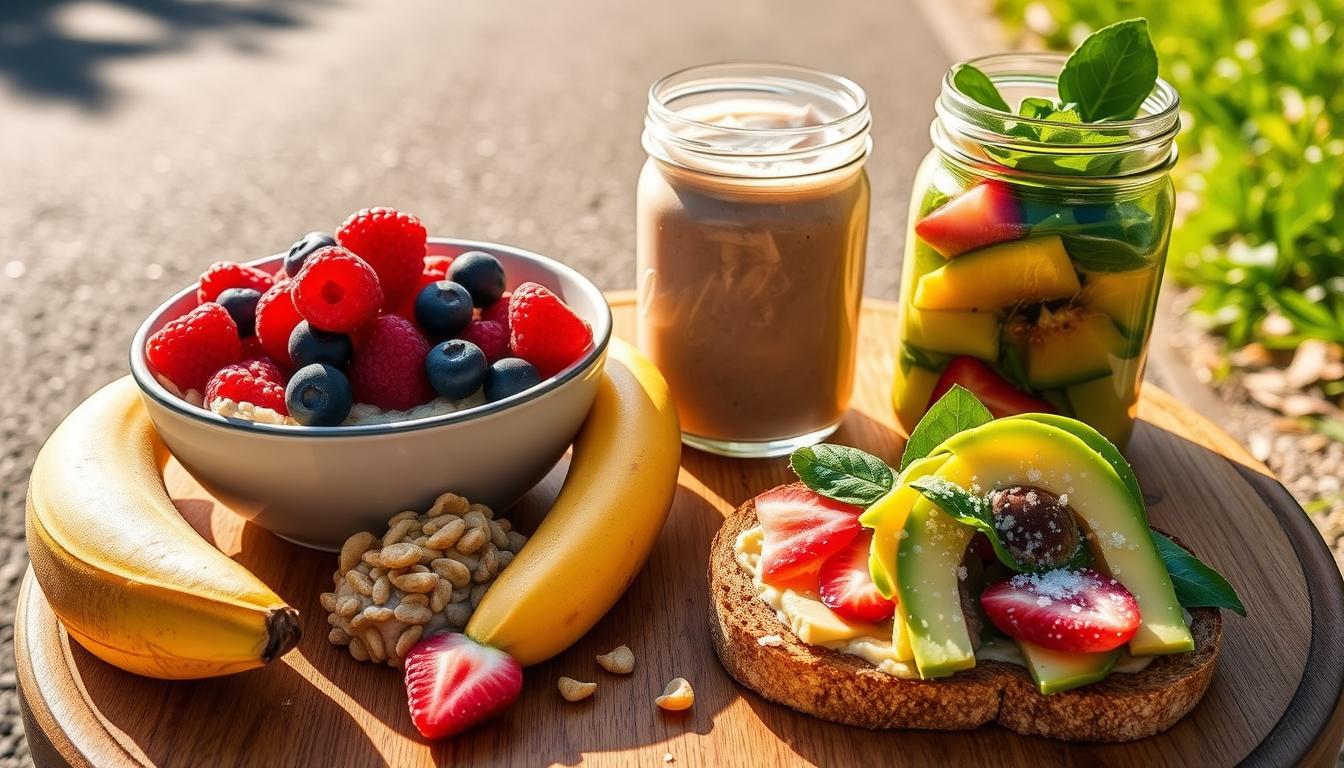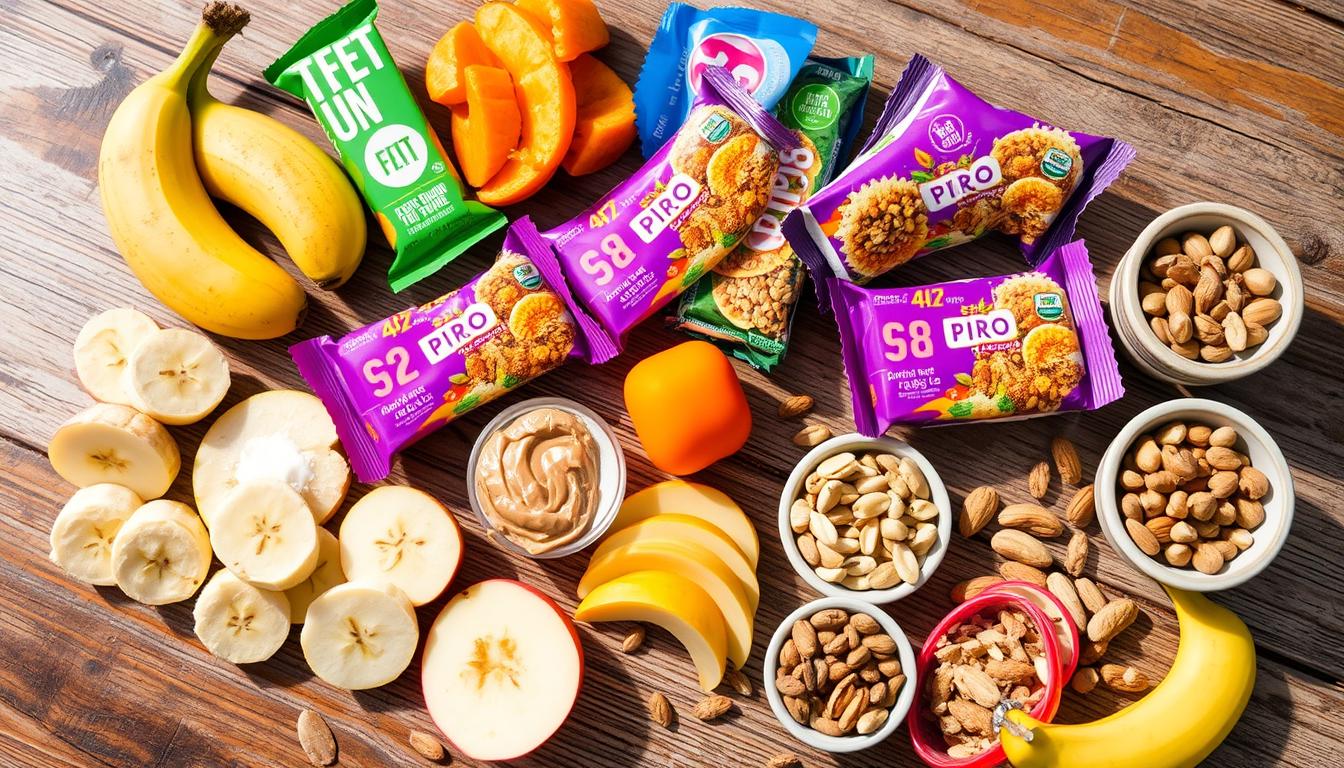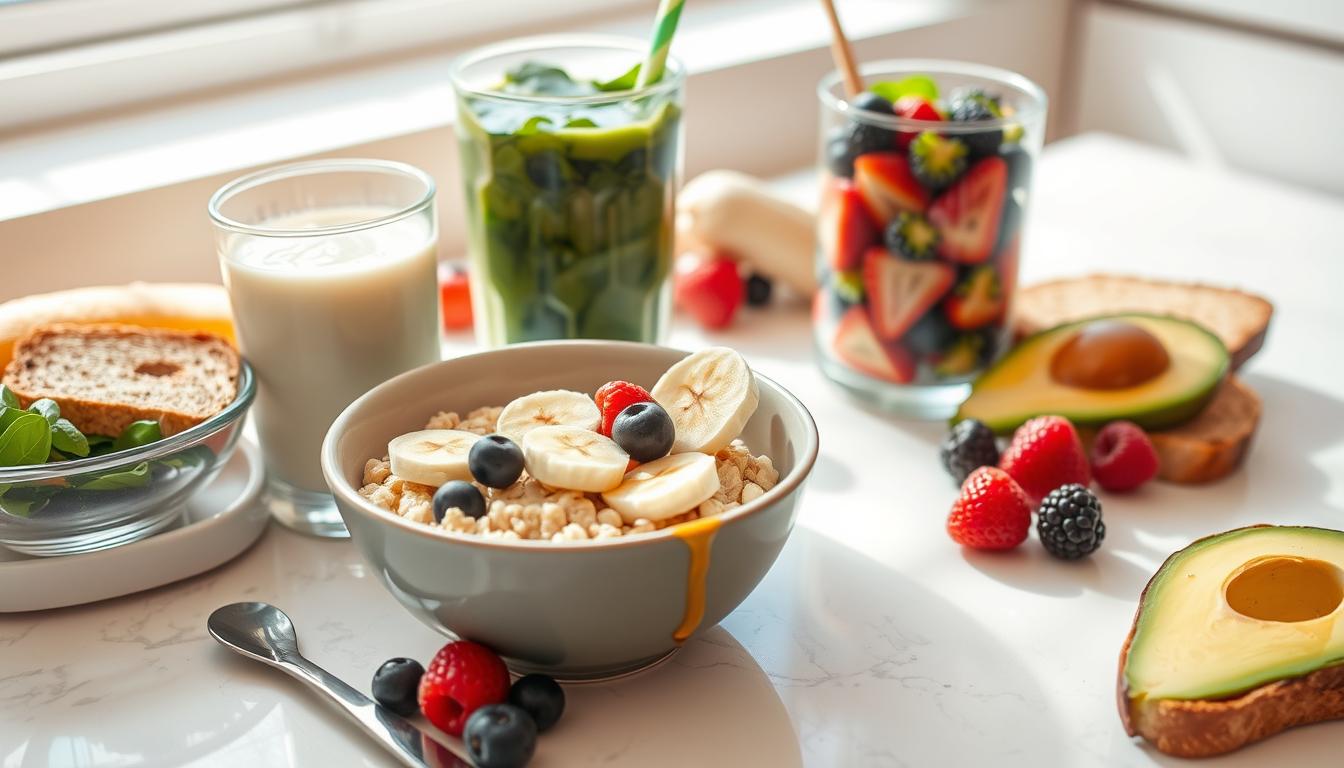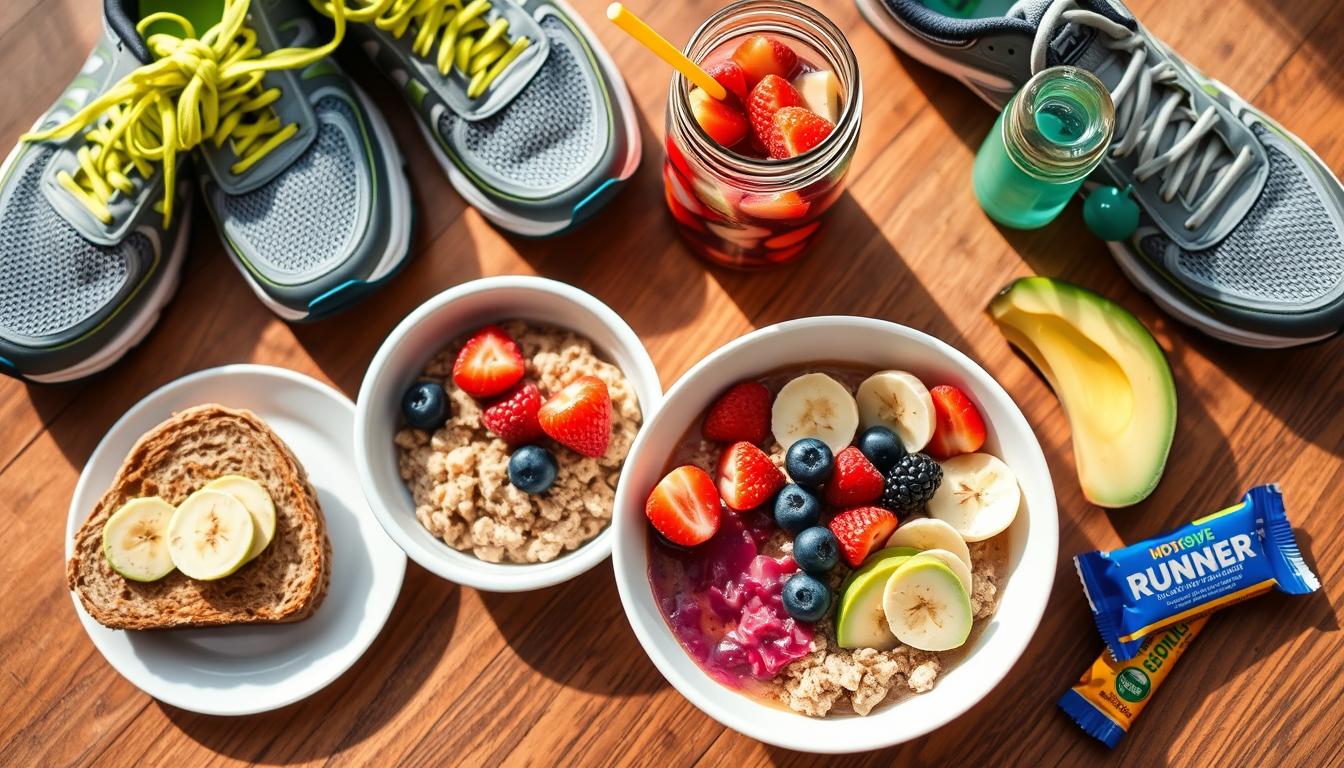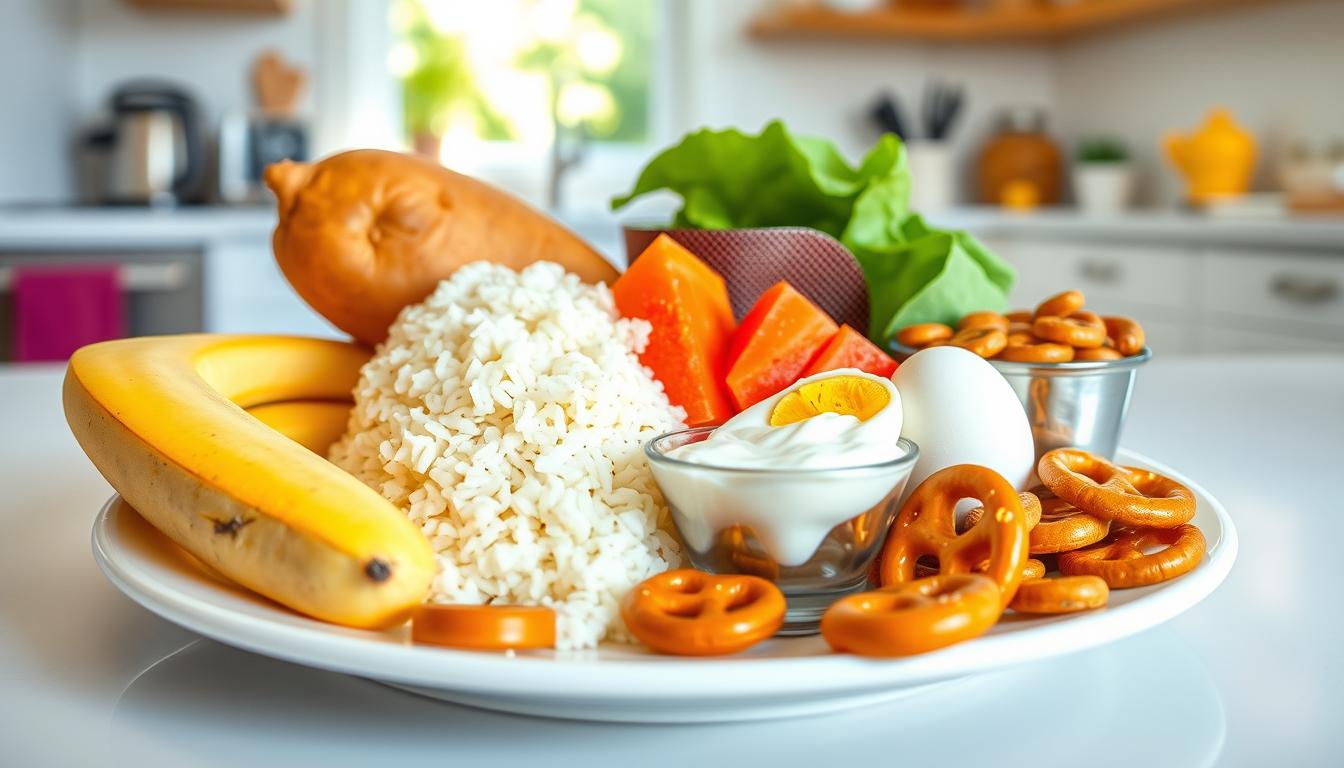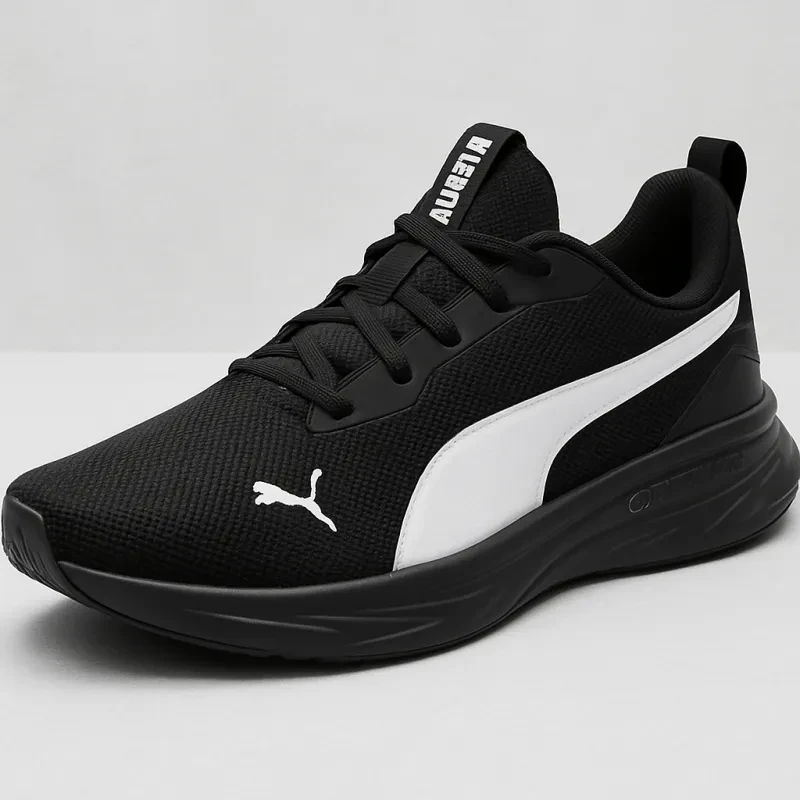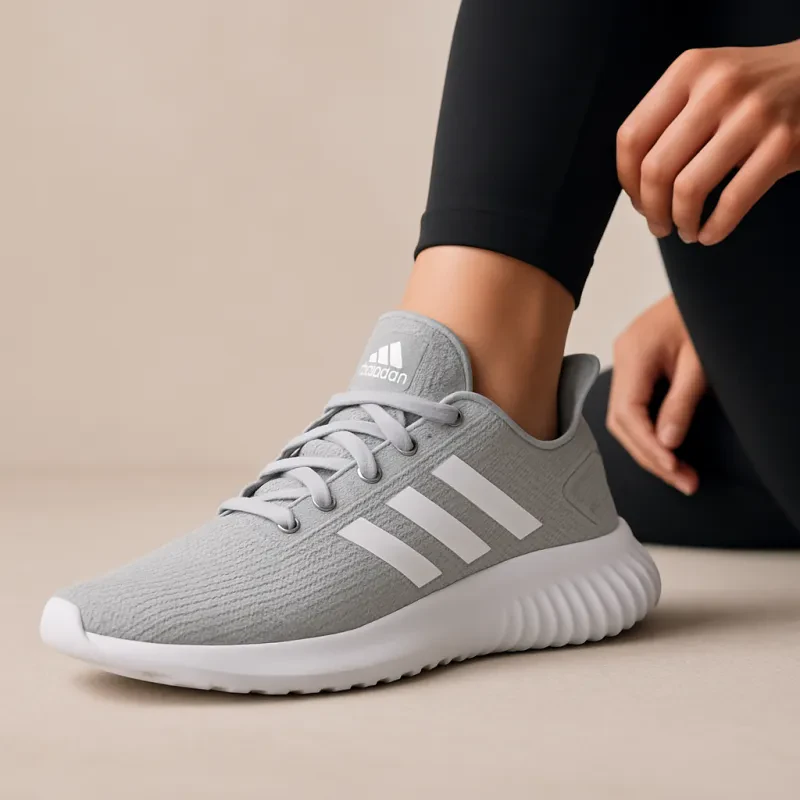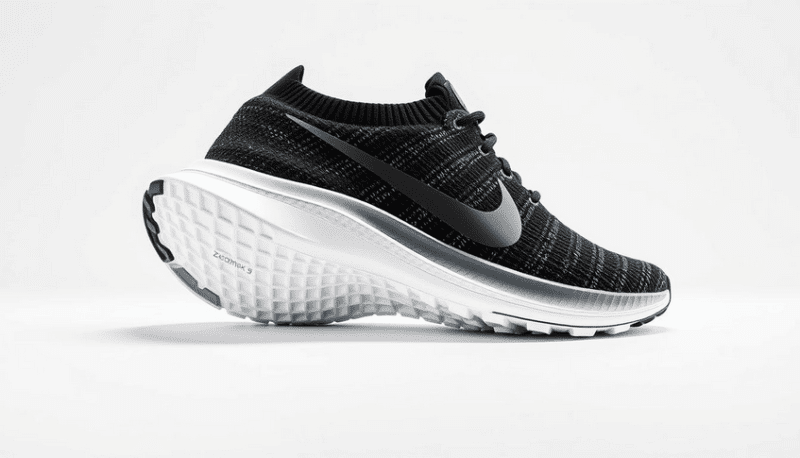For runners, the right food is key. Carbs should be 60-65% of what you eat. You also need protein, fats, vitamins, and minerals to keep your body going and muscles healing.
Runners should eat 1.2 to 1.4 grams of protein for every kilogram of their body weight. This helps fix and keep muscles strong.
When to eat is just as important as what to eat. A light meal 1.5 to 2 hours before running is best. Or, a small snack 30-60 minutes before. Good choices include whole grains, lean proteins, fruits, and low-fat dairy.
Stay away from foods high in fat, spice, and fiber before running. These can upset your stomach and slow you down.
Key Takeaways
- Carbohydrates should make up 60-65% of a runner's total calorie intake
- Runners need 1.2 to 1.4 grams of protein per kilogram of body weight daily
- Consume a light, easily digestible meal 1.5 to 2 hours before running
- Opt for whole grains, lean proteins, fresh fruits, and low-fat dairy as pre-run fuel
- Avoid high-fat, spicy, and high-fiber foods before running to prevent digestive issues
Understanding Pre-Run Nutrition Fundamentals
As a runner, what you eat before running is key. It fuels your performance and keeps you healthy. Knowing about carbs, proteins, and meal timing is essential.
The Science Behind Carbohydrate Loading
Carbs are your main fuel, stored as glycogen in muscles. Eating more carbs before running boosts your glycogen levels. This gives you the energy to power through your workout.
Optimal Protein Intake for Runners
Protein is important for muscle repair and recovery. Runners need 1.2 to 2.0 grams of protein per kilogram of body weight daily. This depends on how hard you train and your goals.
Timing Your Pre-Run Nutrition
When you eat before running matters a lot. Eat a big meal 2-4 hours before to digest and absorb nutrients. For short runs, a light snack 1-2 hours before works.
A balanced "performance plate" has protein, carbs, veggies/fruits, and healthy fats. Choose low-GI carbs for steady energy. Cut carbs for low-intensity runs to burn fat and adapt muscles.
"Proper pre-run nutrition can make all the difference in your performance and recovery."
By grasping these pre-run nutrition basics, you can fuel your body for better endurance, strength, and recovery.
Simple Pre-Run Meals that Won't Weigh You Down
As a runner, you need the right food before a workout or race. You want to feel energized, not weighed down. Choose easy pre-workout fuel, quick energy boosting foods, and gut-friendly running snacks for steady energy. Knowing the science of pre-run nutrition helps you pick the best foods for your runs.
An ideal pre-run meal has lots of carbohydrates to refill glycogen stores. It should also have some protein for muscle recovery and little fats to avoid feeling slow. Go for whole grains, lean proteins, fruits, low-fat dairy, and nut butters. Avoid high-fiber veggies, spicy foods, and heavy, fatty meals that can upset your stomach during a run.
For a quick, portable energizing pre-run bite, try energy balls, fresh fruit, or small flapjacks. These gut-friendly running snacks are easy to digest and give you a steady flow of carbs for your workout. Try different snacks to see what works best for you.
| Recommended Pre-Run Foods | Foods to Avoid Before Running |
|---|---|
|
|
By choosing quick energy boosting foods and easy pre-workout fuel, you can power your runs without stomach trouble. Try different meals and snacks to find the best portable running nutrition for your body and goals.
Morning Runner's Power Breakfast Guide
As a health-conscious runner, your morning meal is key to fueling your body for the day's workout. Choose quick, light, and energizing options that won't slow you down before your run. These healthy pre-run snacks and balanced meals for runners give you the nutrients to power your morning miles.
Quick Whole Grain Options
Begin with a high-carb snack like whole grain toast with peanut butter and sliced banana. The complex carbs from the bread release energy slowly. The healthy fats and protein from the nut butter keep you going. Try avocado toast with juicy tomatoes for another quick and nutritious bite.
Fruit-Based Energy Boosters
Make a refreshing energizing runner's meal with a fruit-based smoothie. Mix Greek yogurt, frozen berries, and a bit of honey for a nutrient-packed, easy-to-digest choice. Or, have a small fruit salad with cantaloupe, pineapple, and kiwi for a natural sugar boost.
Light Protein Combinations
Combine your carb-rich breakfast with a light protein source for muscle recovery. Greek yogurt with granola and berries or a couple of hardboiled eggs on the side offer the right mix of nutrients. They won't upset your stomach during your run.
Your pre-run nutrition needs can change based on your workout's intensity and length. Try different healthy pre-run snacks and energizing runner's meals to find the best fuel for your performance without feeling weighed down.
Strategic Afternoon Running Fuel
Fueling for an afternoon run is all about balance. Eat a light, runner-friendly pre-race meal two to three hours before running. Choose complex carb-loaded pre-run eats and lean proteins for energy without feeling heavy.
Great choices include a turkey sandwich on whole grain bread, a small pasta dish with vegetables, or a quinoa bowl with grilled chicken. For quick energy, try a banana with almond butter or trail mix right after work.
It's also key to stay hydrated throughout the day. Men need 15.5 cups of fluids daily, and women should aim for 11.5 cups. Active people often need more. Drinking hydrating pre-run beverages like water or electrolyte-rich drinks helps prepare you for your run.
| Meal/Snack | Timing | Nutrients |
|---|---|---|
| Turkey sandwich on whole grain bread | 2-3 hours before run | Complex carbs, lean protein |
| Small pasta dish with vegetables | 2-3 hours before run | Complex carbs, fiber, vitamins |
| Quinoa bowl with grilled chicken | 2-3 hours before run | Complex carbs, lean protein |
| Banana with almond butter | 30-60 minutes before run | Quick carbs, healthy fats, protein |
| Trail mix | 30-60 minutes before run | Complex carbs, protein, healthy fats |
Plan your nutritious race day fuel and stay hydrated. This way, you can power through your afternoon runs with confidence.
Foods to Avoid Before Running
As runners, we know how important it is to fuel up right before a workout. But some foods can actually make it harder to perform and feel uncomfortable while running. It's key to avoid certain foods to have a smooth and effective run.
High-Fat Food Restrictions
High-fat foods like fried items, cheese, and bacon are hard to digest, especially before running. These foods can cause stomach discomfort and make you feel heavy during your workout. Choose low-fat, easy-to-digest foods instead to stay comfortable.
Problematic Fiber Sources
Fiber is good for us, but some high-fiber foods like broccoli and Brussels sprouts can cause gas and bloating. These foods might not be the best choice before running, as they can make you uncomfortable. Stick to low-fiber foods that are gentle on your stomach.
Common Digestive Triggers
Caffeine, dairy, spicy foods, and alcohol can upset your stomach and cause cramps or diarrhea. These can really affect your workout. To run smoothly, avoid these foods and drinks before exercising.
Being careful about what you eat before running helps you get the energy you need without stomach trouble. Opt for easy-to-digest foods like bananas, white rice, or plain bagels. They'll fuel your body for a great and comfortable run.
Quick-Digest Snacks for Short Runs
For short runs under an hour, it's good to eat light snacks 30-60 minutes before. Snacks like fresh fruit, small energy bars, or a slice of toast with jam are great. They give you energy without making you feel heavy.
If you run in the morning and can't eat before, eat more carbs at dinner the night before. This helps you have enough energy for your workout. For runs over 90 minutes, a light meal 30-120 minutes before can give you extra fuel.
Try different snacks to see what works best for you. Look for lightweight running snacks and quick energy boosting foods. Having easy pre-workout fuel can really help your short runs. Keep some portable running nutrition ready for those energizing pre-run bites.
FAQ
Q: What are the key considerations for pre-run nutrition?
A: Runners need the right food to perform well. Carbs should make up 60-65% of what you eat. A good diet includes carbs, protein, fats, vitamins, and minerals.
Runners should aim for 1.2 to 1.4 grams of protein per kilogram of body weight each day. It's important to eat a light meal 1.5 to 2 hours before running. Or, have a small snack 30-60 minutes beforehand.
Q: What are some recommended pre-run food options?
A: Good pre-run foods are whole grains, lean proteins, fresh fruits, and low-fat dairy. Stay away from high-fat, spicy, and high-fiber foods to avoid stomach problems.
Q: How do carbohydrates and protein benefit runners?
A: Carbs are the main fuel for runners, stored as glycogen in muscles. Protein helps with muscle repair and recovery. Make sure to eat your meals 2-4 hours before running for large meals, and 1-2 hours for snacks.
Q: What does a balanced pre-run meal look like?
A: A balanced meal should have equal parts protein, carbs, veggies/fruits, and healthy fats. Choose low-GI foods for steady energy. For low-intensity runs, eating less carbs can help burn fat and adapt muscles.
Q: What are some easy-to-digest pre-run meal and snack options?
A: Choose meals high in carbs, with some protein and healthy fats. Good options include whole grains, lean proteins, fruits, low-fat dairy, and nut butters. Energy balls, fresh fruit, and small flapjacks are great snacks.
Q: What should morning runners focus on for pre-run nutrition?
A: Morning runners need quick, light breakfasts. Try whole grain toast with peanut butter and banana or avocado and tomato. Fruit smoothies or small fruit salads are also good for natural sugars and fiber.
Q: How should afternoon runners time their pre-run nutrition?
A: Afternoon runners should eat a light, runner-friendly lunch 2-3 hours before running. Focus on complex carbs and lean proteins. For runs right after work, small snacks like bananas with almond butter or trail mix can give quick energy.
Q: What foods should runners avoid before running?
A: Stay away from high-fat foods like fried items, cheese, and bacon. They digest slowly and can cause discomfort. Also, avoid high-fiber veggies like broccoli and Brussels sprouts for gas and bloating.
Caffeine, dairy, spicy foods, and alcohol can also upset your stomach before a run.
Q: What are some quick and easy pre-run snack options?
A: For runs under an hour, have light snacks 30-60 minutes before. Try fruit, small energy bars, or toast with jam. These give you the fuel you need without upsetting your stomach.
